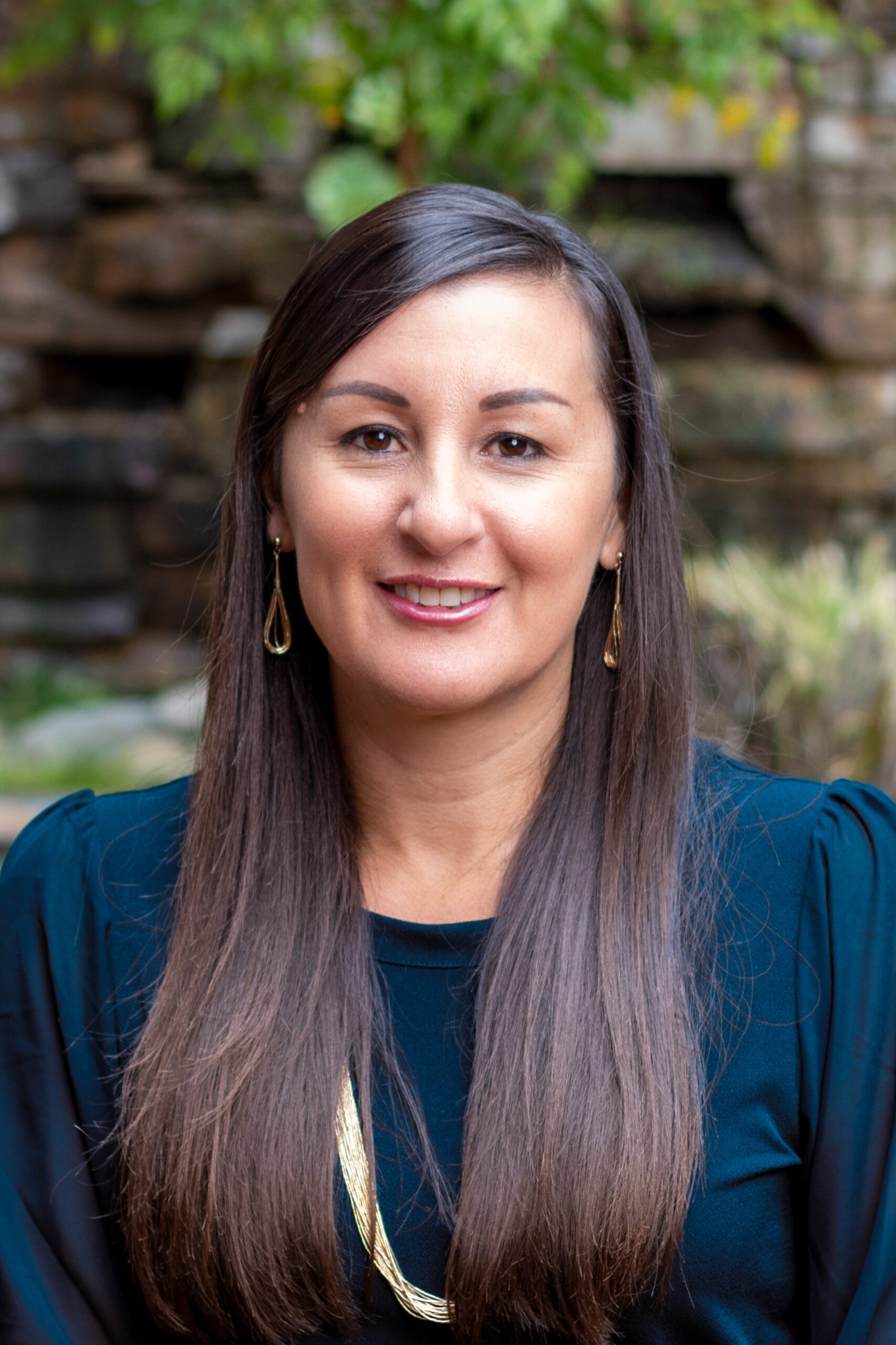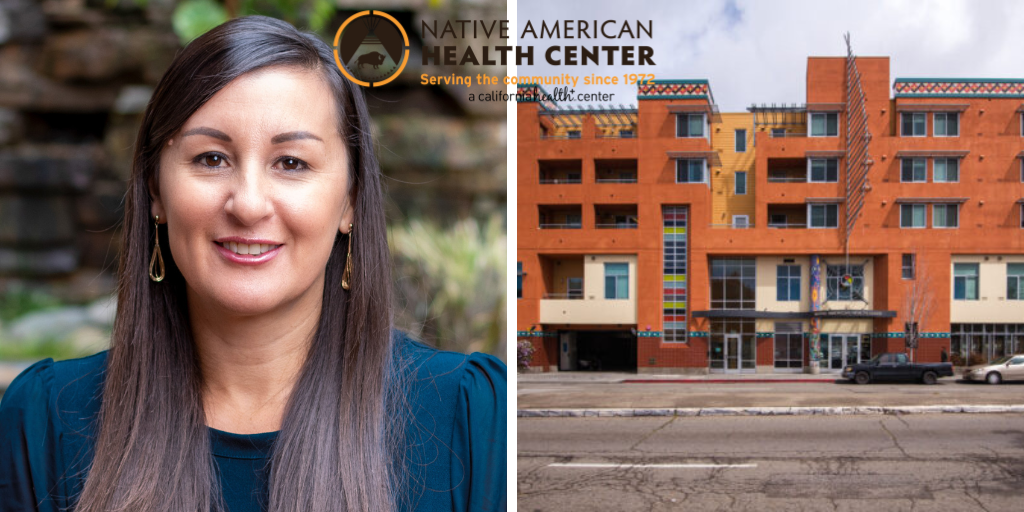Interview with Natalie Aguilera
After four decades of leadership under its former CEO Martin Waukazoo, Native American Health Center (NAHC) has appointed Natalie Aguilera as its new CEO, effective November 1, 2023. As the former Chief Administrative Officer at NAHC, Natalie brings incredible experience, dedication, and commitment to serving Native and Indigenous and other communities cared for by NAHC. We wanted to learn more about her work and what she has envisioned for NAHC’s future.
 Name: Natalie Aguilera, Tribal Affiliation: Choctaw Nation of Oklahoma
Name: Natalie Aguilera, Tribal Affiliation: Choctaw Nation of Oklahoma
Title: Chief Executive Officer, Native American Health Center
Alameda Health Consortium: Tell is a little bit about yourself.
Natalie Aguilera: I grew up here in the Bay Area connected to the Native community, but I never envisioned myself working at Native American Health Center (NAHC). When I was going through a career change, my husband Solis, who was my boyfriend at the time, was working here as Youth Services Director. He suggested I come check it out. He thought I would enjoy working for the community. When I got here, I just fell in love with the people who would later become my colleagues, NAHC’s mission and the communities they serve really resonated with me.
What I really appreciate is that when we sit around a leadership table, the very people that we serve and are representatives of our communities have a seat at that table. To me that was innovative and really exciting. And so, 18 years later, here I am. There’s been great opportunities to move up through the organization, and we have several staff who’ve been here longer than I have, who’ve done the same. It’s been an incredible place to work and grow and learn.
AHC: What was it about community health centers (CHCs) that drew you to their work?
NA: When I got here, I hadn’t realized how much work goes into a community health center. Once I was here, I was able to see how much impact we had on our community and their health, as well as the bigger healthcare system.
Working with a health center like NAHC has a lot to do with my mom who had a lot of healthcare needs, that included physical, mental, and emotional healthcare needs. She would not always have a place to live, and she had a hard time keeping a job. She didn’t do what I thought at the time a mom should do, including what I saw my friend’s mom’s doing—making my lunch every day or having dinner ready for us, taking me to school. Things like that she didn’t do, and as a result I had a little resentment towards her when I was younger. When I was an early teen, she tried to take her own life, and that was really difficult for me to understand and come to terms with at that time. Once I got here to Native American Health Center, I saw that the work we do is serving members who are just like my mom, who have a lot of different and complex needs. Needs that when they’re not met, can have long-lasting negative results. What I learned was that here, in the safe and accepting community health center world, we are able to often meet these different needs. At that time, I didn’t understand historical trauma and the effects it can have on people. Watching our providers serve members in so many ways is really vital and beneficial. It’s not just about medical services, it goes beyond that to a deeper and holistic care approach that people don’t realize community health centers are instrumental in providing.
AHC: You have a rich family history of working with and within the Native and Indigenous communities. Do you feel that this history/experience is important as you take on the leadership role at NAHC? In what ways?
NA: My grandmother, Alice Carnes, was very connected to the Intertribal Friendship House, one of the oldest urban Indian centers in the country and is credited as a co-founder. Hearing from my family about all the work that she did at intertribal Friendship House to support the community and how loved she was for the work and the fact that she did all that work with only an eighth-grade education was amazing to learn. She was really doing community work, and the impact she had on people’s lives is so important. It’s because of the work she did, and organizations like Intertribal Friendship House that came before Native American Health Center, that we are able to continue the work for our community and for the Native community into the future. I see that as a role for myself—in this CEO position—to continue that culture, for our community and for future generations.
AHC: You’ve led some very successful initiatives at NAHC, including the 7 Generations Scholarship Fund. What do you see as the next viable step(s) in expanding NAHC’s reach with patients and the community at large?
NA: The 3050 project! I’m really excited that we’ll be breaking ground on our new facility in early 2024. This new space will really allow us to expand programs and services. Clinical services like medical and dental will be expanded, specifically having 20 Dental operatories because we can’t currently meet the need that’s out there. By opening the new dental operatories, we’ll be able to meet the dental needs, and then use some of the current dental space to expand our medical services because we’re also busting at the seams in that area.
I also wish to meet the growing and evolving needs of our community through the expansive services we’re able to provide. Specifically, the cultural education and outreach provided through the cultural community center. We will be able to continue and expand a lot of our social and cultural services. This will help us tie back our work of keeping Native and Indigenous culture alive for our future generations and it will be a place where people can come and learn and feel a sense of pride.
Additionally, another exciting piece of this project is affordable housing units. Housing is so important in the Bay Area and for our community. Being able to keep our community members in the Fruitvale neighborhood of Oakland is huge, and we’re doing our own small part to help people with housing. We know that having affordable housing and healthcare are interconnected. Our patients can not be worrying about their healthcare needs if they are worrying about stable housing. Being able to help provide a full scope of services is really exciting to me.
AHC: Is there anything else you wish to share about the future you’re hoping to carve out for NAHC?
NA: I’m honored and excited for the opportunity. I appreciate the support of the staff, community, colleagues and excited that I’m going to be held accountable for them to provide good clinical services, keeping our culture rich and alive and moving the organization forward.
You can learn more about Native American Health Center HERE.
